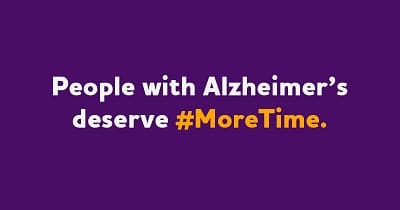“Historic moment:” Today, the FDA gave Biogen’s investigational Alzheimer’s drug aducanumab its approval, with the requirement that they conduct a post-approval trial.
UPDATE: 3 March 2024, 8:37 P.M. ET. In February 2024, Biogen took Aduhelm off the market, citing financial concerns. Although the drug did receive accelerated, conditional FDA approval for the treatment of early Alzheimer’s disease in 2021, it is no longer available to new patients. The company announced it would sunset trials in May 2024 and cease supplying the drug to current patients in November 2024.
In a historic milestone for Alzheimer’s treatment, the federal government today overrode objections from many researchers and gave accelerated approval to a controversial drug for treating Alzheimer’s. The approval of Biogen’s aducanumab marks the first time the government has approved a treatment that attacks the underlying causes of Alzheimer’s. It was the first new drug of any kind to win approval for treating Alzheimer’s in two decades,
The FDA conditioned its approval on a new post-approval large clinical study. The agency said that if the drug does not live up to its preliminary data, it could be removed from the market.
In announcing the decision, the FDA said it was quite aware of the controversy surrounding aducanumab, which it termed Aduhelm. In a statement, Dr. Patrizia Cavazzoni, Director, FDA Center for Drug Evaluation and Research, said that although the data surrounding aducanumab is complicated, “the FDA has determined that there is substantial evidence that Aduhelm reduces amyloid beta plaques in the brain and that the reduction in these plaques is reasonably likely to predict important benefits to patients.”
“Patients with Alzheimer’s disease have an important and critical new treatment to help combat this disease,” she said. The FDA did say that it was requiring Biogen to conduct a post-approval clinical trial to verify the drug’s clinical benefit.
Biogen called the FDA announcement a “historic moment” and said it represents the “culmination of more than a decade of groundbreaking research in the complex field of Alzheimer’s disease.”
“We believe this first-in-class medicine will transform the treatment of people living with Alzheimer’s disease and spark continuous innovation in the years to come,” Biogen Chief Executive Officer Michel Vounatsos said. “We are grateful for the contributions of thousands of patients and caregivers who participated in our clinical trials, as well as for the dedication of our scientists and researchers.”
Dr. Michael Carome, director of Public Citizen’s Health Research Group, said the decision is a “stunning disregard for science and eviscerates the agency’s standards for approving new drugs.”
“Because of this reckless action, the agency’s credibility has been irreparably damaged,” Carome said, adding that the decision should be investigated by the Inspector General for the Department of Health and Human Services.
“Approving aducanumab despite the lack of evidence of effectiveness plus the well-documented risk of serious harm will raise false hope for millions of Alzheimer’s patients and their families, potentially bankrupt the Medicare program because of the drug’s projected exorbitant price and impede for years the development of other experimental treatments for the disease,” Carome said.
Jeff Borghoff, who was a participant in the aducanumab trial for five years, said he was sitting on his porch this morning, nervously refreshing the FDA website. “I prepared myself for this day knowing that if the medication is approved there will be many more years with my wife and family,” he told Being Patient. “And now my family and I have a lot to celebrate.”
“A celebration for more than 6 million people who are living with Alzheimer’s disease and their families and caregivers,” he added. “This is the beginning of a new era. My wife just told me ‘We’re going to have you longer’ as we embraced.”
The Alzheimer’s Association said it welcomes and “celebrates” the FDA’s decision, adding that it will do “everything in its power to ensure access to the drug and requisite tests for all who will benefit.”
“This is the beginning of a new
era. My wife just told me ‘We’re going to
have you longer’ as we embraced.”
“One of our highest priorities will be eliminating barriers to access,” said Dr. Maria Carrillo, the association’s chief medical officer. “We know this is just the beginning of more meaningful treatment advances,” she added.
“We must advance effective treatment options for diverse populations living in all stages of Alzheimer’s and other dementia. And we must address Alzheimer’s through multiple pathways — more than just amyloid — with an eye toward effective combination therapies that work at different stages of the disease, pharmacological and non-pharmacological.”
Patient advocates Jim and Geri Taylor also said they were delighted with the news. Geri is a long-time trial participant. “We know that this joy is shared throughout the Alzheimer’s community,” the Taylors told Being Patient. “The news re-enforces the benefits of increased investment in research and the need for greater participation in clinical trials.”
“Until today, all we had was hope,” the couple added. “Now we have an approved disease modifying therapy.”
The decision foreshadows a new set of challenges: George Vradenburg, chairman and co-founder, of UsAgainstAlzheimer’s, called the FDA decision a “dramatic turning point” in the fight against Alzheimer’s. “Hope will replace despair for many families in the early stages of the disease,” he said. However, he added that his organization is very concerned about the ability of patients to gain access to aducanumab.
“We intend to work with Biogen and Medicare to make access to this drug affordable for every American who needs it,” Vradenburg said.
Aducanumab’s tumultuous drug-development journey
Following the story of aducanumab has been a rollercoaster ride of optimism and disappointment — for researchers and drugmakers, for the Alzheimer’s community, and especially for the drug’s own trial participants, some of whom feel that the drug has been effective in slowing neurodegeneration.
Aducanumab’s twisty and controversy-ridden path began 14 years ago when Biogen signed a $380 million deal with a Swiss pharmaceutical company called Neurimmune. The companies agreed to develop for commercial use a drug that would use human antibodies to sweep a protein called amyloid from the brain.
For decades, researchers have focused on an explosion of amyloid cells in the brain as a potential cause of Alzheimer’s. Researchers and pharmaceutical companies have argued that the amyloid thesis suggests that by removing the excess amyloid plaques, they can slow down the progression of the disease.
Biogen and Eisai, which are co-developing aducanumab, have said that the drug slows down the development of Alzheimer’s in people living in the earliest stages of the disease by 22 percent.
Being Patient’s Aducanumab Primer
What it is, how it works, and other FAQs answered.
But leading up to today’s FDA announcement, the amyloid thesis has failed to produce a new drug for decades. In fact, Biogen and Eisai themselves ended their phase three trials for aducanumab in March 2019, saying that the drug had failed a “futility analysis.”
They reversed that position about seven months later, saying that late-arriving data from the clinical trials proved that the drug was actually working and announced that they would seek approval from the FDA.
At a packed conference in December of 2019, Biogen presented a raft of data that it said proved that aducanumab was effective. But many of the 1,600 or so researchers in the crowd disagreed, arguing the company had not yet proven the drug’s efficacy.
What Happens If Aducanumab Wins
FDA Approval?
It’s complicated! If aducanumab gets FDA approval, how will the
healthcare system meet the anticipated spike in
demand for Alzheimer’s diagnosis and therapy?
That theme was heavily reinforced when an 11-member FDA advisory panel all-but-unanimously rejected the idea that the drug worked, and instead suggested that the FDA should require Biogen and Eisai to run another large clinical trial of the drug.
The Peripheral Central Nervous System Drugs Advisory Committee is a group that includes professors of neurology, biostatistics and medicine, as well as patient and industry representatives. At the end of a six-hour meeting, the committee rejected the evidence, presented by Biogen and the FDA staff, that aducanumab slows cognitive decline in people who participated in clinical trials.
In a series of votes at the end of the meeting, the committee split on the question of whether aducanumab presented “strong evidence of a pharmacodynamic effect on Alzheimer’s disease pathophysiology.” Five members of the committee voted yes, saying the drug does impact the amyloid proteins that some believe are a cause of neurodegeneration. A majority of six, however, said the evidence was unconvincing.
In its final vote, the committee was asked if Biogen has presented “primary evidence of effectiveness of aducanumab for the treatment of Alzheimer’s disease?” Overwhelmingly members said no with a vote of 0 yes, 10 no, and 1 uncertain.
In the weeks leading up to the FDA’s decision, researchers have been vocal about their unease regarding aducanumab. Two prominent doctors placed an essay in the New York Times urging the FDA to reject aducanumab. And Dr. Jason Karlawish, co-director of the Memory Center at the University of Pennsylvania, wrote in Stat News that even if the FDA were to approve aducanumab, he would not prescribe it to his patients.
What’s Next for Passengers on the Aducanumab
Clinical Trial Rollercoaster?
Following the unexpected snag in aducanumab’s FDA approval,
Being Patient reporter Phil Gutis reflects on the significance of participating
in the drug’s clinical trial — regardless of the FDA’s decision.
“The consequences of FDA approval are as disturbing as they are vast,” Karlawish said. “Around 2 million Americans could be prescribed aducanumab, at an estimated cost that ranges from $20,000 to $50,000 per person per year.
“Biogen claims the benefits of slowing declines in cognition and day-to-day function are worth this price,” he continued. “I think the company is wrong,” he added, saying that “the data to make this case is murky and, even if they were clear, the drug’s benefits are ambiguous at best and not worth the cost.”
Other prominent physicians strongly disagreed. In an interview with BeingPatient, Stephen Salloway, a longtime principal investigator of an aducanumab trial and the director of Butler Hospital’s Memory and Aging program, argued in favor of an FDA approval.
“I’ve had a lot of experience with this drug,” Salloway said. “I’ve been involved with the development of it right from the beginning in people, and I probably have treated the most people in the world on this drug. The good news is that the majority of people that were on it actually stayed pretty stable over a pretty long period of time, which is not typical for Alzheimer’s because Alzheimer’s gets gradually worse,” Salloway said. “Preserving quality of life in early stages of Alzheimer’s is worth a lot, and families who at least had this stability really appreciate it.”
Want to learn more about clinical trials
for Alzheimer’s and dementia?
Check out the Lilly Trial Guide.
NOTE, 11:52 AM ET 7 June, 2021: This article is being updated in real time to include new reaction quotes and additional information.
CORRECTION: 16:26PM ET 7 June 2021: The status of approval has been updated to specify accelerated on the condition of a post-approval trial, as opposed to an FDA “conditional approval.”




I’m confused. Is the available now or not?is it covered by Medicare?
So grateful to the FDA on their very wise decision of approval. Those out there who go against their approval decision and to do much more research need to be reminded that “people are dying everyday from this disease” doesn’t that matter to you? My friend JoAnne died from this disease quite quickly. We miss her! Thanks FDA you made the right decision!!